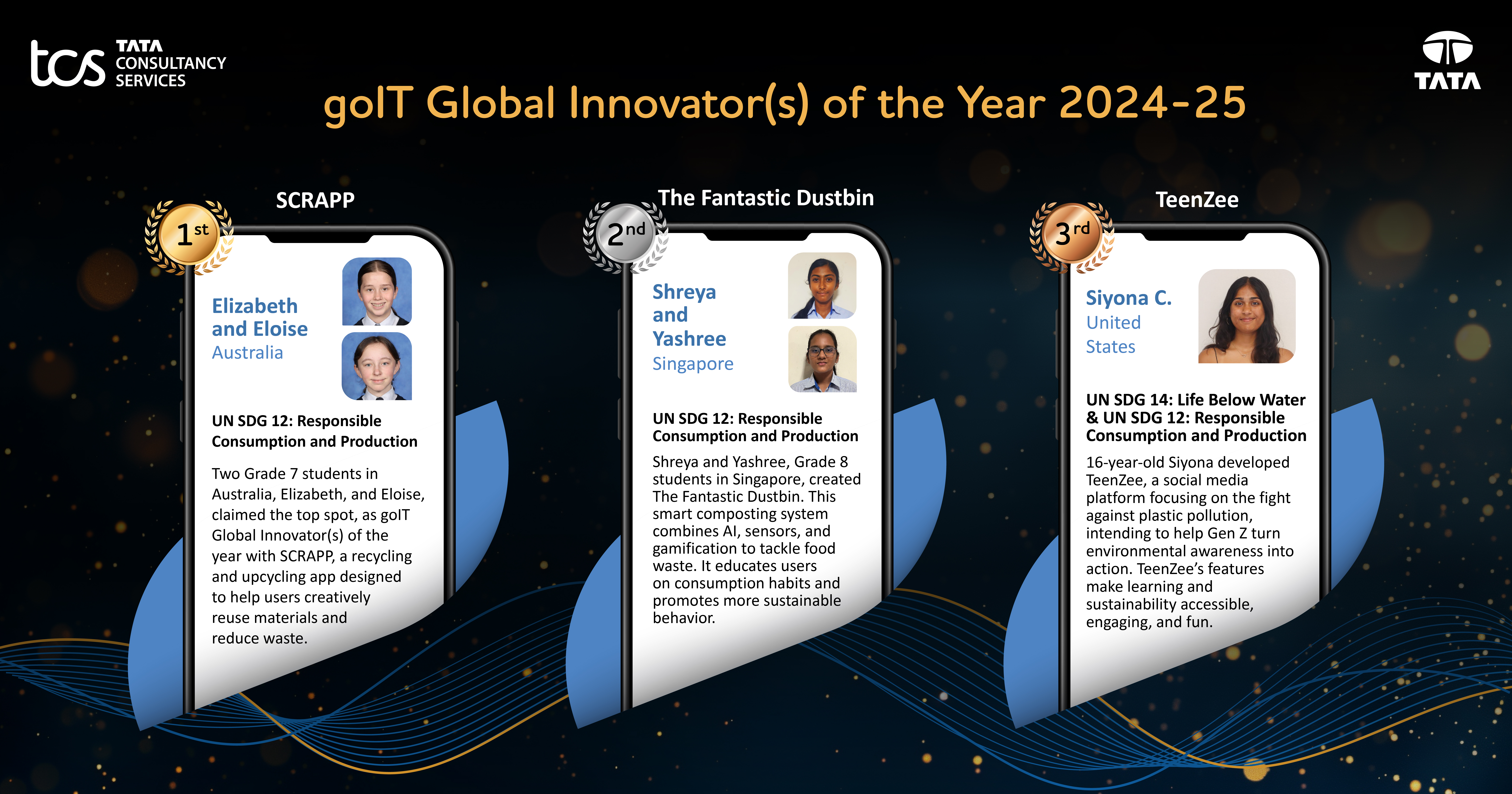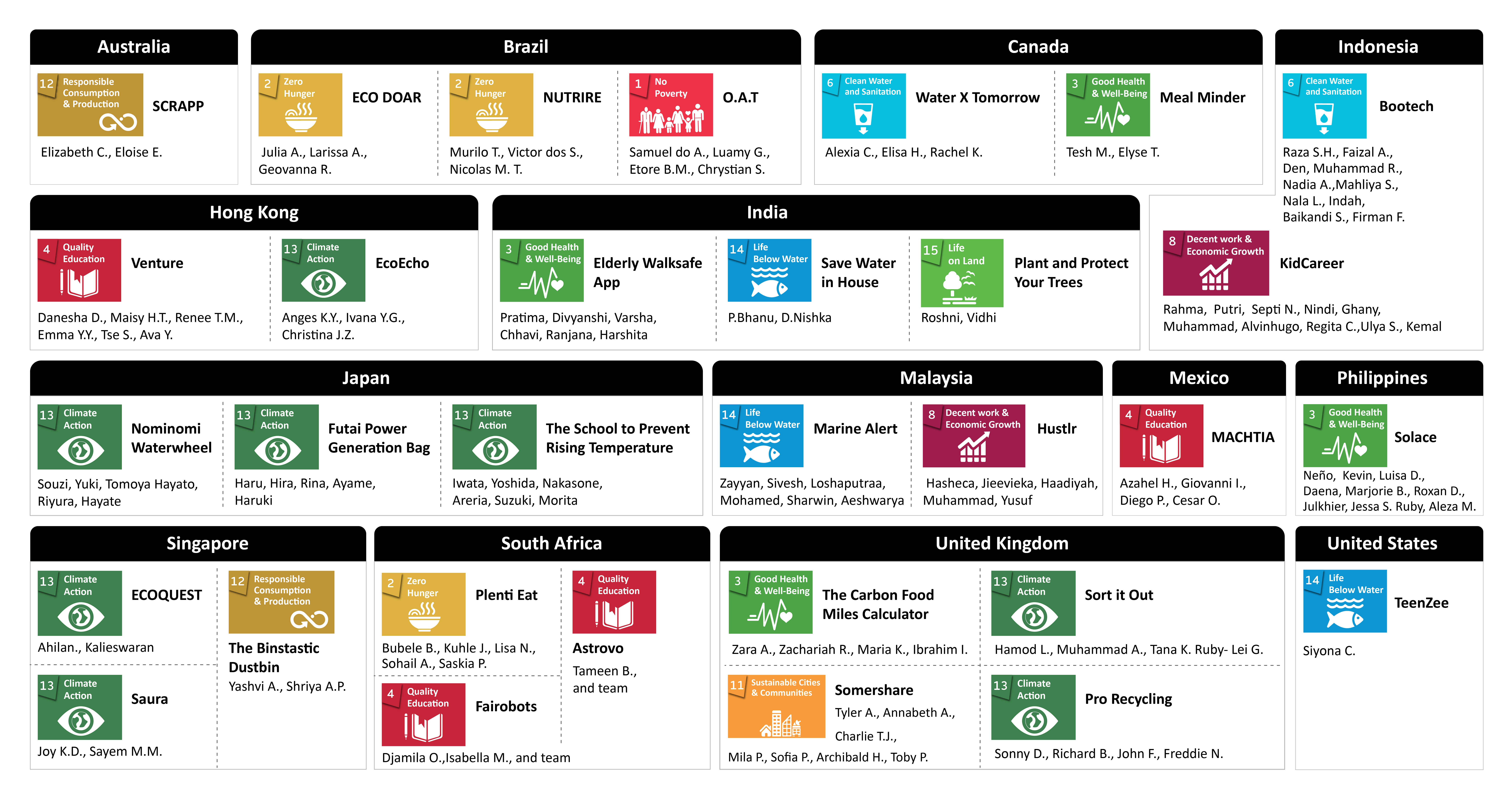Who we are
Highlights
- TCS’ goIT Global Innovator of the Year competition, an annual competition hosted by the company’s Corporate Social Responsibility (CSR) program recognizes and celebrates the ingenuity and creativity of young student innovators dedicated to making a positive impact on people, communities, and the planet.
- The 2024-25 goIT Global Innovator of the Year competition considered innovations from over 80,000 students under 18 yrs interested in Science, Technology, Engineering, Mathematics (STEM) education representing 49 countries.
- Judging of the final 22 innovations concluded with the identification of all-female first, second, and third student winners, notable as women and girls are underrepresented in STEM education and professions.
- goIT, as the flagship program among various TCS Empowers initiatives, inspires innovation, and global citizenship, equipping students around the world with the skills, confidence, and mindset to pursue STEM careers of the future.
On this page
The Innovation Contest
TCS’ goIT Global Innovator of the Year competition challenges students in STEM worldwide to design technology solutions to real-world problems. As part of TCS’ flagship program, the annual goIT Global Innovator of the Year competition invites students aged 6 to 17 to harness technology as a force for good by developing prototypes of digital innovations with intentions aligned with the United Nations’ 2030 Sustainable Development Goals (UN SDGs).
Volunteer judges from TCS and its customer and partnership community select student finalists according to a rubric that helps assess each qualifier’s ability to demonstrate innovation, social impact, and market understanding.
“TCS’ goIT Innovator of the Year contest gives students the opportunity to see themselves as innovators, leaders, and global citizens,” said John DiChiara, Global Head of goIT. “Empowering youth with the skills they’ll need to create a future they believe in is really our privilege.”
Tech for solutions
Through goIT, students around the world are reimagining technology-led innovative solutions—not just as a tool for convenience but as a solution to real-world challenges aligned to UN SDGs
This year’s most compelling student innovations focused on issues that touch lives in immediate and meaningful ways. Students addressed topics such as climate resilience, food equity, inclusive education, clean water, and more. Their prototypes demonstrate how empowering technology can be when shaped by purpose.
The winners
First place: Elizabeth and Eloise – Australia
Prototype: SCRAPP
UN SDG 12: Responsible Consumption and Production
Two Grade 7 students in Australia, Elizabeth and Eloise, claimed the top spot, as goIT Global Innovator(s) of the year with SCRAPP, a recycling and upcycling app designed to help users creatively reuse materials and reduce waste.
SCRAPP began with a simple question, “Can you guess which one of these images is from our recycling bin and which one is from a waste bin?” That moment revealed an unsettling truth. Contaminated recycling often ends up in landfills, doing more harm than good.
As a concept, SCRAPP is a solution that uses artificial intelligence (AI), gamification, and community tools to educate, engage, and empower users to make responsible waste management decisions. It is designed to be fun and effective. Whether scanning a package for sorting instructions, exploring interactive mini-games, or sharing DIY projects with friends, users of SCRAPP can transform environmental sustainability into something as personal as it is impactful.
The 2025 goIT student winners also integrated ChatGPT for real-time system prompts and used Google Machine Learning to enhance data accuracy.
Second-place winners: Shreya and Yashree – Singapore
Prototype: The Fantastic Dustbin
UN SDG 12: Responsible Consumption and Production
Shreya and Yashree, Grade 8 students in Singapore, created The Fantastic Dustbin. This smart composting system combines AI, sensors, and gamification to tackle food waste. It educates users on consumption habits and promotes more sustainable behavior.
Third-place winner: Siyona – United States
Prototype: TeenZee
UN SDG 14: Life Below Water & UN SDG 12: Responsible Consumption and Production
16-year-old Siyona developed TeenZee, a social media platform focusing on the fight against plastic pollution, intending to help Gen Z turn environmental awareness into action. TeenZee’s features make learning and sustainability accessible, engaging, and fun.
Perks for the winners
Congratulations to all finalists for their achievement in the goIT Global Innovator of the Year competition.
In recognition of their commitment to building a more sustainable future, each team of student innovators will work closely with their regional goIT program teams to receive additional prizes and opportunities such as mentorship, additional coaching, speaking engagements, and more!
Global reach
TCS goIT teams implemented the goIT Global Innovator of the Year competition across every region the company operates in, including Europe, Asia Pacific, the Americas, the Middle East and Africa, India, Australia, New Zealand, and China. In all, judges selected 22 innovations for the final competition from a global pool of over 8,100 innovations and 80,000 students using a standardized judging process.
For more information, visit: North America | APAC | Europe | India | LATAM | MEA | UK&I


